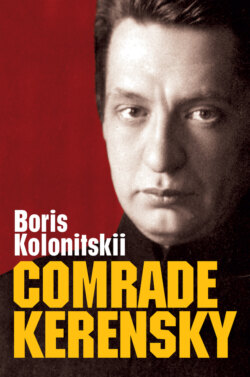Comrade Kerensky

Реклама. ООО «ЛитРес», ИНН: 7719571260.
Оглавление
Boris Kolonitskii. Comrade Kerensky
CONTENTS
Guide
Pages
New Russian Thought
Comrade Kerensky. The Revolution against the Monarchy and the Formation of the Cult of ‘The Leader of the People’ (March–June 1917)
Dedication
Acknowledgements
Introduction
Notes
I Revolutionary Biography and Political Authority
1 Biography and biographers
2 The youth of the Leader
3 ‘Tribune of the people’
4 ‘Hero of the revolution’
5 ‘Champion of freedom’ and the cult of champions of freedom
Notes
II ‘Revolutionary Minister’
1 The great conciliator
2 The omnipresent ‘minister of the people’s truth’
3 ‘Democratic minister’
4 ‘Minister of revolutionary theatricality’ and ‘poet of the revolution’
5 ‘Great martyr of the revolution’
6 Kerensky as Louis Blanc: features of the Bolsheviks’ political propaganda
7 ‘Rebellious slaves’ and the ‘great citizen’
Notes
III ‘Leader of the Revolutionary Army’ 1 The iron discipline of duty
2 The visit to Helsingfors
3 The ‘Kerensky Declaration’
4 ‘Tireless victor’: Kerensky at the front
5 ‘Wanted: a Napoleon’: Kerensky and Bonapartism
6 The Bolshoy Theatre and the birth of the New Man
7 Kerensky and the Socialist Revolutionary Party
Notes
IV The ‘Kerensky Offensive’
1 ‘Commender-in-chief’: rhetorical preparations for the offensive
2 ‘Kerensky’ and ‘Lenin’
3 The June Crisis and the June Offensive
4 A popular ‘brand’ and symbol of the revolution
Notes
Conclusion
Notes
Index. A
B
C
D
E
F
G
H
I
J
K
L
M
N
O
P
R
S
T
U
V
W
Y
Z
POLITY END USER LICENSE AGREEMENT
Отрывок из книги
The publication of this series was made possible with the support of the Zimin Foundation.
Boris Kolonitskii, Comrade Kerensky
.....
During 1917, other Bolsheviks recalled their contacts with Kerensky. For example, at the end of August, Ivan Skvortsov-Stepanov published an article in which he touched on the career of Kerensky, who by then was already the head of the Provisional Government. The Bolshevik recalled a meeting with him in November 1916, by which time Stepanov believed the Trudovik leader had moved to the left. Nevertheless, he claims, Kerensky believed the hand of the Okhrana and imperial court, which he considered Germanophile, was behind workers’ unrest.120 We might take this as an attempt by a prominent Bolshevik to discredit the head of the Provisional Government by suggesting Kerensky had failed to understand the real mood of the workers, and hence was questioning the democratic credentials of the leader of the February Revolution. The article can, however, be read in a different way, with even Kerensky’s political opponents, the Bolsheviks, acknowledging his involvement in the activities of the illegals. This could only be to the benefit of his standing.
Other actions during the war redounded to Kerensky’s credit. Well informed about the mood among the illegals, he urged the liberals to give no quarter in the fight against the regime and insisted that the country was on the brink of revolution. Most of them thought he was being overly optimistic,121 but after the downfall of the tsar the Trudovik leader’s surmises were sometimes treated as infallible predictions.
.....